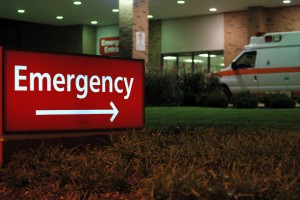 For an up close and personal look at America’s drug culture, try a ride-along with a patrol car on the night shift. Or spend an evening as a volunteer in a busy emergency room. In some cities, that’s Drug Central.
For an up close and personal look at America’s drug culture, try a ride-along with a patrol car on the night shift. Or spend an evening as a volunteer in a busy emergency room. In some cities, that’s Drug Central.
Check out this New York Times piece by an ER physician on the subject.
Everyone acknowledges that our healthcare system has been over-reliant on the ER as a primary care provider. Some of that stems from the need to treat folks who lack health insurance and the funds for a treatment in the doctor’s office. That often leads them to the ER, where they feel they can’t be turned away. The ACA has put a dent in this, but there’s a long way left to go.
On your ER visit, you’ll no doubt encounter people who genuinely need emergency care, plus people who could have been treated in the doctor’s office, and also people who are there mainly to obtain drugs such as prescription painkillers and sedatives. Depending on the area served, that last group will take up a fair number of seats in the waiting room.
These folks are called ‘drug seekers’, and hospital staff around the country struggle to manage them, often with little success. Many have become quite cynical. Here’s a YouTube clip made from a staffer’s viewpoint:
And here’s our article on “The Professional as Target: Being Manipulated,” and our series on Medical Manipulation.
Drug addicts quickly learn that a threat to disrupt the ER’s smooth function– well, relatively smooth function– is a very effective way to increase the likelihood of a cooperative response from the prescribing physician. It becomes easier to dash off a prescription for Oxy than to argue with a determined patient.
There’s a scene in an episode of one TV medical show where the nurse shows up in the ER waiting room to announce a minimum two-hour wait to see the doctor “unless we can see you’re bleeding.” As she turns away, she explains to her student that it’s to clear out the drug-seekers.
As the author of the NYT piece concludes, “a deep cultural shift within our health care system is needed.” That’s true enough. It’s a focus of the nation’s effort to take advantage of the hospital visit to screen, intervene, and refer for drug treatment (SBIRT). If you’re not familiar with this important effort, and others related to improving healthcare for persons with substance problems, IRETA is a very good resource.
Still, it takes a long time to change medical practice, especially in the chaotic universe of modern healthcare in the US. That leaves us envying some other nations who may have far fewer resources than we do, but somehow manage to make better use of them.








